 |
| Defense attorney Michael Lasher |
Defense attorney Michael Lasher answers his phone. There’s a convicted killer on the line.
David Bollinger is housed on death row inside the Ely State Prison, where he has spent 23 years for the murder of an elderly Reno couple. The jury found the former temporary worker had kidnapped and killed James and Rose Vertres in 1992, setting their bodies on fire.
Now Bollinger languishes inside a small solitary cell, awaiting his turn to die.
He dials Lasher from a pay phone not 60 feet from his medieval lockup. Dressed in his prison blues, he stares straight ahead at a cinder-block wall during a rare bit of contact with the outside world.
Lasher is Bollinger’s lawyer. At age 50, he’s a slight man with boyish, oversized glasses and curly red hair. He resembles a young Buddy Holly or Woody Allen, a teen still awaiting his growth spurt, but with the emotional scars of somebody who’s been around.
The veteran capital punishment defense attorney took on Bollinger’s case after moving to Las Vegas in 2015 as a new member of the federal government’s public defender’s team. He took the call inside his cluttered downtown office, whose passageways reek from the decay of case files that line the walls.
These phone meetings are haphazard. Frequent prison lockdowns triggered by inmate violence means Lasher can wait for calls that never come. More often, Bollinger and Lasher rely on rudimentary “kites” traded through the prison communication system.
“Hey, David,” he says informally, as though greeting a fellow lawyer, or a drinking buddy.
They discuss Bollinger’s appeal for a retrial that cites judicial bias based on the public defender’s alleged conflict of interest. The lawyer says he took a rare Sunday off the day before, a break from the relentless grind of the appeal. Bollinger is glad.
Lasher knows what he faces. The case contains “bad facts,” including that the couple’s bodies were found in flames inside a dumpster. Still, thanks to his research, he sees questions unanswered and issues unresolved.
Bollinger maintains his innocence.
Lasher is turning his legal experiences into literature. He’s writing a memoir that’s largely confessional, exploring how his work with convicted killers has triggered his own existential doubts.
The book’s title, “They Eat Their Own,” is not a reference to the incarcerated but to the lawyers who represent them; a legal clan from which Lasher has for years desperately sought acceptance. He calls them The Tribe, a deeply flawed collection of “do-gooder twits, death penalty abolitionists and street fighters,” lawyers often wrongly accused of “fighting dirty on behalf of murderers.”
Lasher’s work is a delicate legal and emotional dance. As he fights for society’s damned and depraved, he confronts his own inadequacies. Despite 25 years as a lawyer — 17 trying capital cases — the sheer complexity of the appeals, public prejudice against convicted killers and his own fear of failure conspire against him.
Knowing that hundreds of convicted killers have already been exonerated nationwide creates a strange pressure. It makes him question his grit and tactics, makes him feel as clumsy as a dirt farmer performing a finely timed waltz.
Along with his work as an attorney, Lasher has also spent years as an investigator, exploring the backgrounds of his death row clients. He has traveled the world, seeking insights into their violent behavior, hoping to uncover new facts or an unreported witness account that might reduce a death penalty to life in prison.
Lasher observes strangers closely, like a social worker. “Some folks are really poor, living in squalid deep woods trailers with pirated electricity or violent housing projects with their own subterranean societies. Some live in banal suburbs, which bum me out more than a sand-blasted house in the middle of an empty block in the high desert.”
Lasher trusts no one; not judges, prosecutors, lazy defense lawyers and public defenders, witnesses, or even some of his hundreds of clients. As an investigator, he pursues not whodunits, but “why-dunits” — crimes involving torture, shuddering violence and multiple victims. Innocence, he says, isn’t the issue in most of his cases.
“Capital punishment brings out people’s worst behavior,” he said. “Cops, prosecutors and judges want convictions … Justice tends to be greater for convicted killers. Prosecutors justify their means, saying, ‘If this guy didn’t do this one, he did others.’ It’s a win-at-all-costs mentality.”
In his writing, Lasher found he couldn’t detail his work without also revealing himself.
“The book became an exorcism of the things I’ve witnessed,” he said. “It’s also a way to process some of my own demons – similar to a 12-Step program.”
He asked himself hard questions: “Why was I trying to save the condemned?” and “Why was I driven to protect mostly nasty broken people?”
Source: Las Vegas Review-Journal, John M. Glionna, June 3, 2017. Award-winning journalist John M. Glionna, a former Los Angeles Times staff writer, may be reached at
john.glionna@gmail.com. Follow @jgionna on Twitter.
⚑ | Report an error, an omission, a typo; suggest a story or a new angle to an existing story; submit a piece, a comment; recommend a resource; contact the webmaster, contact us:
deathpenaltynews@gmail.com.
Opposed to Capital Punishment? Help us keep this blog up and running! DONATE!












